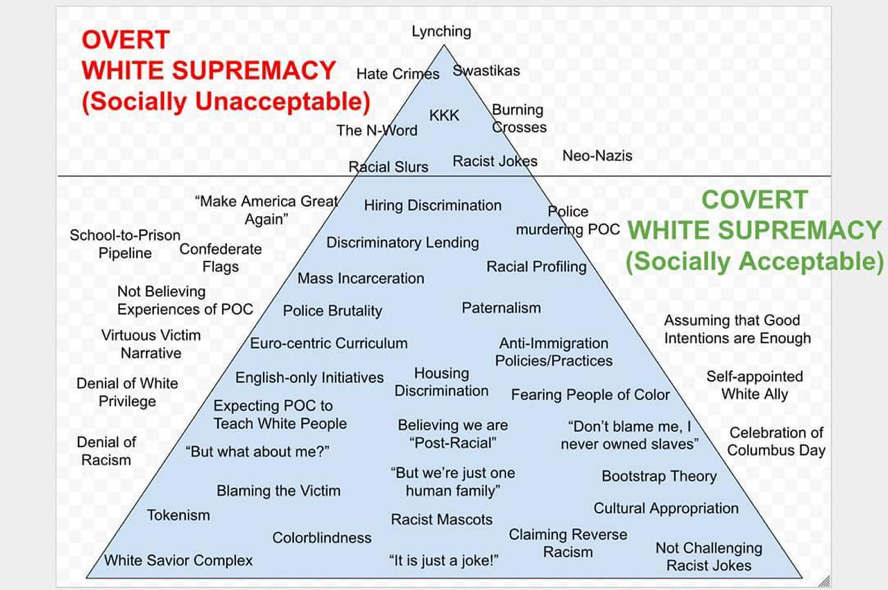Rebooting
I started the “Jumping the Shark” section of Confessions of a Truthaholic because some things are so nonsensical they need to be called out. They may be well-intentioned, but they simply miss the mark. If you’re unfamiliar with the term, I summarized it here.
However, once this election cycle began, the amount of propaganda, or “the spreading of ideas, information, or rumor for the purpose of helping or injuring an institution, a cause, or a person” (per merriam-webster.com), coming across the airwaves was mind-boggling. And it didn’t discriminate. Falsehoods and fallacies exploded across the entire landscape of social and political thought and it was simply too much to address (which is the whole point of propaganda).
—
While I can’t keep playing whack-a-mole with everything, I can focus on one area that’s dangerously disturbing for all of us, whether left, right, center, or off the grid, and that’s the weaponization of the law by Americans against Americans. It has absolutely jumped the shark!
We have low legal literacy in the United States so it’s easy to convince people that the government is always in pursuit of justice for all, not just some. But we all know that’s not true, not now and certainly not at different times in our past.
TO BE CLEAR …
We have incredible law enforcement officers and public servants at all levels of government who do an outstanding job protecting citizens in their jurisdictions, and they deserve our recognition and support. And, fortunately, they’re part of the overwhelming majority. But, as with every other group, the bad apples need to be routed out.
Calling out the bad “law” apples will be the subject of the content I share here for the foreseeable future. Lawfare, or the weaponization of the law to achieve a political purpose, is an ongoing issue—not just an election season challenge—that’s too important to ignore.
On Hate Crimes
Governor Tim Walz, Kamala Harris’ running mate, has been campaigning on the premise that there’s “no guarantee to free speech on misinformation or hate speech, and especially around our democracy.” He claims that if the government deems something to be misinformation, then it’s not protected by the First Amendment.
» READ THAT AGAIN.
Our candidate for Vice President thinks that if the government deems some speech “misinformation,” then it’s not protected by the U.S. Constitution.
» I THINK HE’S CONFUSED. GOVERNMENT SUPPRESSION OF SPEECH IS WHAT HAPPENS IN A COMMUNIST GOVERNMENT, NOT IN A CONSTITUTIONAL REPUBLIC.
Yes, Governor Walz, on this topic, you are a knucklehead, and you jumped the shark.
The First Amendment
The First Amendment to the United States Constitution reads as follows:
Congress shall make no law respecting an establishment of religion, or prohibiting the free exercise thereof; or abridging the freedom of speech, or of the press; or the right of the people peaceably to assemble, and to petition the Government for a redress of grievances.
It’s pretty straightforward.
In America, anyone can say anything at any time to anyone, without government intervention, including censorship, suppression, and penalties, save a handful of carefully prescribed exceptions. Among these exceptions are:
advocacy of the use of force when directed to incite or produce imminent lawless action;
false statements of fact intending to harm another (aka defamation);
fighting words or speech that tends to incite an immediate breach of peace; and
fortunately, child pornography.
This should give you a sense of the type of speech that can be policed in the interest of public safety. Even then, restrictions are limited to time, place, and manner of speech, i.e. when, where, and how it’s communicated. They cannot restrict the content itself, no matter how offensive it may be. Whether such speech is “acceptable” is for the marketplace of ideas to decide. The people will work it out - the government need not apply.
Back to Tim Walz
Earlier this week, Walz sat down for an interview with Glennon Doyle, her sister Amanda, and her partner Abby Wambach on the We Can Do Hard Things podcast.
Erin Reid, a well-known transgender activist, summarized the interview in The Advocate. I quote (emphasis mine):
Abby Wambach asked, “Well, thank you Governor Walz so much for protecting even in the late ’90s queer kids. And so I have to ask, what will a Harris-Walz administration do to protect our queer kids today?”
Walz discussed positive legislative actions, such as codifying hate crime laws and increasing education, while emphasizing the importance of using his platform to advocate for LGBTQ+ rights. He then addressed the role of judges in safeguarding medical care for queer youth: “I also think what Abby, your point is on this, and I was just mentioning, we need to appoint judges who uphold the right to marriage, uphold the right to be who you are, making sure that’s the case, uphold the right to get the medical care that you need. We should not be naive. Those appointments are really, really important. I think that’s what the vice president is committed to.” …
“We see it now; the hate has shifted to the trans community. They see that as an opportunity. If you’re watching any sporting events right now, you see that Donald Trump’s closing arguments are to demonize a group of people for being who they are,” Walz said. He continued, “We’re out there trying to make the case that access to healthcare, a clean environment, manufacturing jobs, and keeping your local hospital open are what people are really concerned about. They’re running millions of dollars of ads demonizing folks who are just trying to live their lives.”
The article continues, but I want to stop here and address one (1) specific issue Walz raised in his response: codifying hate crimes.
Codifying Hate Crimes
In 2023, Congresswoman Sheila Jackson Lee (RIP) introduced H.R. 61 (House Resolution 61 - the 61st bill proposed in the 118th Congress) “to prevent and prosecute white supremacy inspired hate crime and conspiracy to commit white supremacy inspired hate crime and to amend title 18, United States Code, to expand the scope of hate crimes.” Title 18 of the United States Code contains the criminal code of the federal government. It deals with federal crimes (not state crimes) and criminal procedure.
Per the proposed bill, “a person engages in a white supremacy inspired hate crime when white supremacy ideology has motivated the planning, development, preparation, or perpetration of actions that constituted a crime or were undertaken in furtherance of activity that, if effectuated, would have constituted a crime.”
Note: Neither white supremacy nor white supremacy ideology was defined or otherwise described in any portion of the House Resolution.
Matthew Shepard and James Byrd, Jr.
Let’s look at the Matthew Shepard and James Byrd, Jr. Hate Crimes Prevention Act (enacted in 2009), codified in Section 249 of Title 18 [18 U.S.C. Sec. 249]. The statute addresses hate crimes specifically.
Per the statute, hate crimes are defined as …
“[O]ffenses involving actual or perceived race, color, religion, or national origin … [where someone] willfully causes bodily injury to any person or, through the use of fire, a firearm, a dangerous weapon, or an explosive or incendiary device, attempts to cause bodily injury to any person, because of the actual or perceived race, color, religion, national origin, gender, sexual orientation, gender identity, or disability …”
Ms. Jackson Lee’s proposed bill would have amended this section of the Matthew Shepard and James Byrd, Jr. Hate Crimes Prevention Act to add the following wording after “national origin” in the first line … “or because of a white supremacy-based motivation against any person.”
Hence, the definition of hate crimes would be amended to …
“[O]ffenses involving actual or perceived race, color, religion, or national origin, or because of a white supremacy based motivation against any person [where someone] willfully causes bodily injury … because of the actual or perceived race, color, religion, national origin, gender, sexual orientation, gender identity, or disability …”
Note: Again, neither white supremacy nor white supremacy ideology is defined or otherwise described in any portion of the House Resolution.
The proposed statute, or law, also outlines that a conspiracy to engage in white supremacy-inspired hate crimes can be shown through social media posts and other publications.
Do We Need Hate Crimes Legislation?
That said, let’s consider the issue as a practical matter.
Prosecuting hate crimes is extremely difficult because it requires proof of motive beyond a reasonable doubt, something that is not generally required for other crimes, including premeditated murder.
The “hate” itself doesn’t constitute the crime, i.e. murder, the “hate” is the alleged “motivation” for the actual crime, i.e. murder. The idea is that the motive should stiffen the penalty for a defendant convicted of a bias-motivated crime.
But, here’s the rub.
If a defendant is convicted of murder and is sentenced to life in prison or the death penalty, does the motivation really matter?
How many lives does the defendant have to serve in prison?
How many lives does the defendant have to be executed?
I reached out to a friend—who is a federal prosecutor—to help me understand the use of hate crime statutes in federal prosecutions.
Here’s the gist of what he shared:
There are a number of federal statutes that are associated with the term “hate crime.” While there are certainly some gaps in federal law in which certain kinds of conduct might not be captured, the legislative scheme is still fairly comprehensive and of course state criminal laws can often serve to fill the gaps.
As prosecutors, we are driven by the need to prove each and every “element” of each offense beyond a reasonable doubt (BARD). An element is the existence of a factor which makes up the body of criminal law and – to use the Latin phrases – involves actus reus and mens rea, as well as the jurisdictional hooks that allow for prosecution.
(For example, in federal criminal law, we often have to prove some element of interstate effect or nexus to have jurisdiction to charge in the first place).
Simply put, we must prove that the person charged acted with the requisite intent. Our jobs then are tied to proving each and every element of each crime beyond a reasonable doubt. It can’t be, “well, it kinda FEELS like he’s guilty so we’ll ask the jury to convict.” It also can’t be, “well, we proved 3 out of the 4 elements beyond a reasonable doubt but not the 4th one.” Each and every element must be proven BARD. This is an enormously high burden (and rightfully so).
Try to find 12 strangers who will agree on ANYTHING beyond a reasonable doubt!
Prosecutors are eager to hold criminals accountable and protect the public. We want good tools to do that. Well-drafted and clear statutes with readily-defined terms are essential. If it is vague or undefined, we lose (and rightfully so).
One difficulty with proving hate crimes is that they add an element of proof that virtually no other type of criminal statute contains. That element is motive. Intent and motive are not the same thing.
Intent does not require the extra step of proving “why.” Sometimes the motive is relevant to and evidence of the requisite intent but it need not be proven itself in the vast majority of other statutes. The risk of course then becomes that we have proven BARD the actus reus and mens rea (ordinarily sufficient for convictions on other criminal statutes) but NOT the element of motive. The jury in that instance is duty bound to acquit, even if it FEELS like the defendant is guilty.
So the risk is obvious – making the prosecutors prove extra elements (especially ones that involve extra “stuff” existing in someone’s brain) – makes our jobs become more difficult. Not only do we have to prove that someone possesses the requisite improper bias or animus, we also have to prove that the bias motivated the conduct.
Because this is a difficult task, the definitions must be clear. If, for example, you want to criminalize conduct based on the motivation of advancing “white supremacy,” that term must be clearly and objectively defined. It cannot be based on subjective whims and interpretations of the term but rather on concrete objective standards and definitions clearly stated in the statute.
Personally, I think there is much conduct covered by “hate crimes” legislation that can also be charged a different way, and I would rather do it that way, because I’m not trying to advance a narrative, make a cultural statement or prove anything other than the defendant committed a federal crime and should be held accountable. Those are the parameters of my job.
I have prosecuted authentic white supremacists on other statutes unrelated to hate crimes, and they have served or are serving lengthy sentences.
If there is any way to achieve the end goal of reasonable criminal accountability without having to prove additional difficult-to-prove elements, I’m gonna do it that way. I don’t want to have to prove something extra to get to the same place.
So the risk of hate crimes and the added element is that we fail to hold someone accountable that we otherwise could have with a different statute. Of course, were I to charge a hate crime, I would charge the additional statutes I thought fit the conduct and intent of the defendant as well if they applied. That somewhat ameliorates the risk.
At the end of the day, the elements of the offense and the evidence to support those elements should dictate prosecutorial charging strategy; nothing else.
To learn more on this topic, check out the Department of Justice’s hate crimes and enforcement website.
Given the above, let’s look at a couple of real-world examples …
George Floyd
The charges filed against Derek Chauvin in the George Floyd case did not allege a hate crime since, per the Department of Justice’s investigations, there was no evidence to support a finding that Chauvin’s actions were motivated by race.
Absent evidence sufficient to prove racial motivation beyond a reasonable doubt (the burden of proof in ALL criminal cases), it would be impossible to secure a conviction.
As my friend suggested above, one might ask … “why risk an otherwise sound criminal case that carries extreme punishment?”
How a crime is charged doesn’t comment on the tragedy of the situation, it reveals that the evidence didn’t lead to the conclusion that racial bias was the motivation for police action.
Hence, the maxim, if you can’t prove it, don’t charge it.
James Byrd, Jr.
You may recall the horrifying 1998 murder of James Byrd, Jr. in East Texas, the same year Matthew Shepard was beaten and left for dead. Three white men were convicted of Mr. Byrd’s murder - they chained him to the back of a pickup truck, dragged him for miles, and dumped his remains in front of a church.
Two of the defendants, who were avowed white supremacists with ties to the KKK, have been executed. The third is serving a life sentence in prison.
Byrd’s killers were brought to justice by applying traditional state murder statutes that did not include a mandate to prove a bias motivation to obtain a conviction. While investigators dug deep into the murderers’ motives, the prosecutors’ didn’t bear the burden of proving motive BARD.
The public was outraged, not by the convictions, but by the failure to charge the murders as hate crimes.
Had the Texas prosecutors not been able to prove BARD that racial animus was the motivation, even though they did prove intent BARD, there’s a strong possibility the murderers would not have been convicted, absent other intervening circumstances (see below for more on this).
If the public was happier about the charges, but the defendants were acquitted because the evidence to support motive (which is subjective) BARD just wasn’t there, would justice have been served?
I think not.
To put a finer point on it, let’s look at the elements of premeditated first-degree murder in the United States Code 18 USC Sec. 1111.
The prosecutor has to prove beyond-a-reasonable-doubt (BARD) that:
The victim was killed.
The defendant caused the death of the victim with malice aforethought (intention to kill or harm).
The defendant did so with premeditated intent.
The killing took place within the special maritime or territorial jurisdiction of the United States.
Now, let’s add a fifth element - motivation:
The defendant caused the death of the victim because of the actual or perceived race, color, religion, national origin, gender, sexual orientation, gender identity, or disability.
If the prosecutor successfully proves the first four elements BARD, but not the fifth, he will not have met his burden and the jury will have to return a not-guilty verdict. If the defendant was also charged with a different or lesser crime, they may be able to convict on those, but not on the hate crime.
Again, can you imagine the public outrage then?
Appeasing the public is not the prosecutor’s job. Enforcing the law against bad people who break it is.
Back to Ms. Jackson Lee …
Irrespective of the above, Representative Jackson Lee proposed amending the Hate Crimes portion of the criminal code, specifically 18 USC Sec. 249, to add crimes "inspired by white supremacy” to the list of hate crimes.
The bill (proposed law) explains that a white supremacy-inspired hate crime happens when someone publishes (on a social media platform or elsewhere) material advancing white supremacy, white supremacist ideology, antagonism based on ‘replacement theory,"‘ or hate speech that vilifies or is otherwise directed against any non-White person or group …”
Note: And again, neither white supremacy, white supremacist ideology, nor antagonism based on “replacement theory”” are defined in the bill.
Are we to draw our own assumptions about what it means? The following chart originally developed by the Safehouse Progressive Alliance for Nonviolence in 2005 was floated as a guide at the time.
For the reasons above, efforts to pass “hate crimes legislation” are usually more about political posturing than seeking justice. Indeed, they impede justice.
While Tim Walz may garner votes from his target demographic, lawmakers who understand that expressing what some deem to be “hate” isn’t a crime will stand up to protect the rest of us who have a different opinion.
So, the next time you hear a politician promote the importance of “hate crimes legislation,” think twice.
Thank you for reading and supporting my work.
Writing as always in pursuit of the truth, the whole truth, and nothing but the truth.
xo,
Kelley
October 18, 2024












Thank you so much for this article Kelley! It was VERY informative.